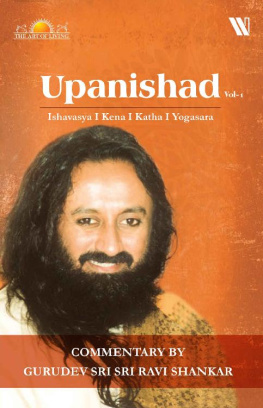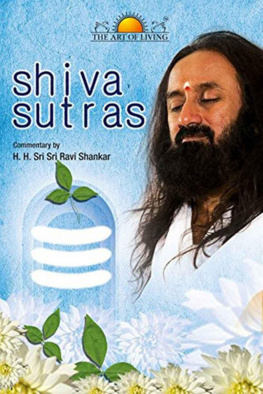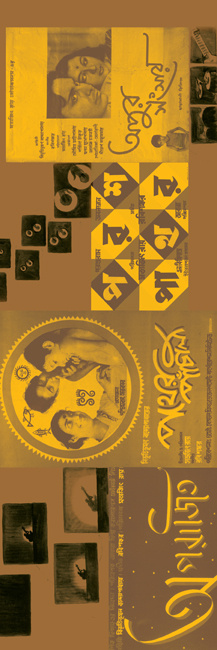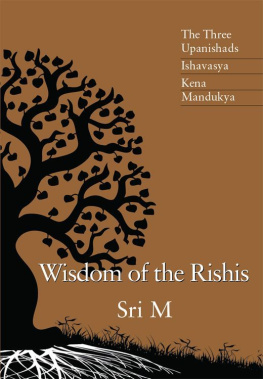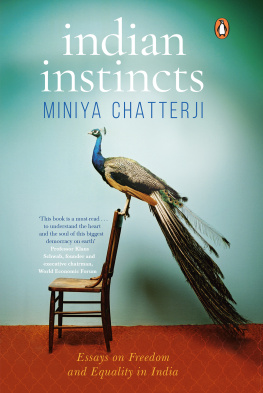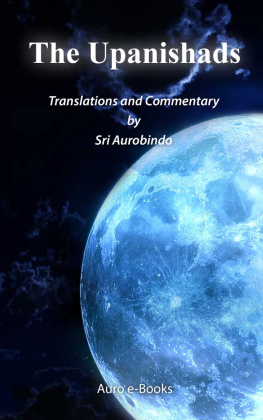Sri Sri Ravi Shankar - Upanishads Vol 1: Ishavasya, Kena, Katha, Yogasara
Here you can read online Sri Sri Ravi Shankar - Upanishads Vol 1: Ishavasya, Kena, Katha, Yogasara full text of the book (entire story) in english for free. Download pdf and epub, get meaning, cover and reviews about this ebook. year: 2018, publisher: Westland, genre: Religion. Description of the work, (preface) as well as reviews are available. Best literature library LitArk.com created for fans of good reading and offers a wide selection of genres:
Romance novel
Science fiction
Adventure
Detective
Science
History
Home and family
Prose
Art
Politics
Computer
Non-fiction
Religion
Business
Children
Humor
Choose a favorite category and find really read worthwhile books. Enjoy immersion in the world of imagination, feel the emotions of the characters or learn something new for yourself, make an fascinating discovery.
- Book:Upanishads Vol 1: Ishavasya, Kena, Katha, Yogasara
- Author:
- Publisher:Westland
- Genre:
- Year:2018
- Rating:5 / 5
- Favourites:Add to favourites
- Your mark:
- 100
- 1
- 2
- 3
- 4
- 5
Upanishads Vol 1: Ishavasya, Kena, Katha, Yogasara: summary, description and annotation
We offer to read an annotation, description, summary or preface (depends on what the author of the book "Upanishads Vol 1: Ishavasya, Kena, Katha, Yogasara" wrote himself). If you haven't found the necessary information about the book — write in the comments, we will try to find it.
Upanishads Vol 1: Ishavasya, Kena, Katha, Yogasara — read online for free the complete book (whole text) full work
Below is the text of the book, divided by pages. System saving the place of the last page read, allows you to conveniently read the book "Upanishads Vol 1: Ishavasya, Kena, Katha, Yogasara" online for free, without having to search again every time where you left off. Put a bookmark, and you can go to the page where you finished reading at any time.
Font size:
Interval:
Bookmark:

First published in 2018 by Westland Publications Private Limited in association with Sri Sri Publications Trust
Westland Publications Private Limited, 61, 2nd Floor, Silverline Building,
Alapakkam Main Road, Maduravoyal, Chennai 600095
The Art of Living International Centre, 21st KM, Kanakapura Road, Udayapura, Bangalore 560082.
Email: , Website: www.sattvastore.com ,
Toll Free: 1800-258-8888
Westland and the Westland logo are the trademarks of Westland Publications Private Limited, or its aliates.
Copyright Sri Sri Publications Trust, 2018
ISBN: 9789387578951
All rights reserved
The views and opinions expressed in this work are the authors own and the facts are as reported by him, and the publisher is in no way liable for the same.
No part of this book may be reproduced, or stored in a retrieval system, or transmitted in any form or by any means, electronic, mechanical, photocopying, recording, or otherwise, without express written permission of the publisher.
Contents
Vowels

Consonants

Hindi Counting
1 2 3 4 5 6 7 8 9 10

Gurudev: You may ask some questions. What do you want to listen to today? Hmm?
[A man in the audience says, The Upanishad!]
Gurudev: The Upanishad? This is the Upanishad !
Upanishad is sitting close sitting close to the Master, not just physically, but also mentally and were all sitting very close, physically and mentally!
Now, what does sitting close or mentally sitting close to the Master mean?
It means understanding the words of the Master.
Some things cannot be fully expressed in words; they can only be indicated. Few words suffice when the subject is really deep. Whatever you can describe is gross. If you can describe something totally, it is totally gross. The subtler you go, the more difficult it becomes to express, the more difficult to describe.
You can experience pain, but its difficult to describe that pain totally. You can experience an emotion, but its impossible to describe it totally, let alone make someone else experience it. So you can experience love, but you cannot describe or express it, totally. This is why lovers are always sort of restless. They want to express it, but they cannot find the words to do so. They cannot find a single expression, capable of totally expressing what they feel. But sitting close to the Master (that is Upanishad ), you catch many things. You catch the inexpressible, you catch something that is indescribable.
Here, words are simply a vehicle; a lot more flows between the words energy moves, grace moves, joy moves and that transforms life.
There is an innate tendency to unite because to love is to unite.
So what does love mean?
It is the tendency to unite, to become one.
To become one with what? What is this tendency to unite?
In this entire creation, there is a tendency to become one, to get back to one, because two is painful. Going from two to one is the purpose of creation. Everything wants to merge into something but what is that?
We call that love. The Rishis called it Yoga . So Yoga means union, uniting, but uniting what?
That is what we will see in this Yogasara Upanishad.
Gurudev Sri Sri Ravi Shankar
Weggis, Switzerland
Lets all chant the shanti mantra . All the Upanishads begin with a shanti mantra.

om pramada, pramida prt pramudacyat; prasya pramdya pramvvaiyat om ntii, ntii, ntii
(That is full, this is full. From fullness does fullness come. If you remove the full from the full, the full alone remains. Om, let there be peace, peace, and peace.)
Upanishad means sitting close, sitting near the master - the student and the teacher sit close. It is not just physical proximity. It is mental or emotional proximity. Only when there is connectivity can knowledge flow. When there is no connectivity - the student is at one level and the teacher at another- then they are speaking in different languages and knowledge cannot blossom. You can get information but for knowledge to get imbibed, there needs to be mental closeness, spiritual closeness, a sense of belongingness and that is Upanishad - sitting close by.
Today the issue in the world is that students in colleges or children in classrooms are on a different rhythm than the teacher. So, they only pass on information, there is no transfer of knowledge. For knowledge to get transferred we have to be in the same rhythm and that can only happen when there is peace. Thats why all the Upanishads start with a shanti mantra . A peaceful mind can probe into something beyond; it can grasp that something which cannot be grasped by the small mind. The intellect cannot access things which your spirit can have access to. And for that, closeness is essential. This exercise has been in existence the world over right from the time of Socrates. The guru of Socrates used to give this exercise to the students to see whether the student is on the same rhythm, same wavelength as the teacher. Is there that inquisitiveness to know? Or is he caught up in some petty wishes and desires or is he focussed about knowing something that is beyond? Are you an empty cup or are you already overflowing? If you are already overflowing, nothing more can be added to you. If a student thinks he already knows everything then he is no more a disciple. He is only there to verify what he already knows. So, be hollow and empty, have the willingness to know and have that faith in the teacher that the teacher knows.
A student should believe in the wisdom of the teacher and the teacher should believe in the sincerity of the student. Then they are on the same wavelength. The teacher doubts whether the student is sincere or not, whether he has come here to study or has been pushed into the class by his parents. This is the discord that we are seeing in the world. Why, in spite of so many universities and colleges, do we not have people with wisdom or minds with knowledge? The reason is disconnect. The student should have faith in the wisdom of the teacher and the teacher should have faith in the sincerity of the student and hence, the shanti mantra. The shanti mantra says Poornamadaha . This is one of the greatest gifts to humanity. The concept of zero comes from this very shanti mantra . In linear mathematics you will always find that when something is taken out of something, that something from which something is taken out lacks. If you take furniture out of this room, this room will not be the same as before. This is linear thinking. But here the Rishis give you a completely different outlook to life - That is full and this is also full. This fullness has come from that fullness and in spite of this fullness having come from that, that fullness still remains full. This is spherical thinking A mother gives birth to a baby. The baby is complete and the mother is also complete. Just because the baby is born, the mother is not lacking something. In fact it has added to her glory. This is the concept of zero without which nothing could have happened on this planet - science could not have progressed. The origin of the concept of zero is in this very shanti mantra . From the fullness comes fullness and still the fullness remains full.
Next pageFont size:
Interval:
Bookmark:
Similar books «Upanishads Vol 1: Ishavasya, Kena, Katha, Yogasara»
Look at similar books to Upanishads Vol 1: Ishavasya, Kena, Katha, Yogasara. We have selected literature similar in name and meaning in the hope of providing readers with more options to find new, interesting, not yet read works.
Discussion, reviews of the book Upanishads Vol 1: Ishavasya, Kena, Katha, Yogasara and just readers' own opinions. Leave your comments, write what you think about the work, its meaning or the main characters. Specify what exactly you liked and what you didn't like, and why you think so.

